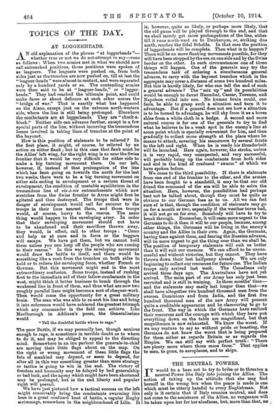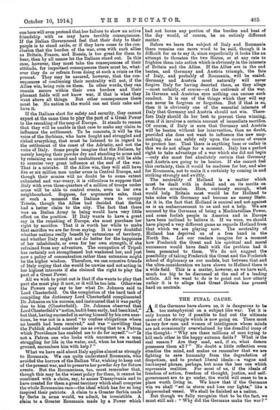THE NEUTRAL POWERS.
IT would be a base act to try to bribe or to threaten a neutral Power like Italy into joining the Allies. The notion of taking up the attitude that she may find herself in the wrong box when the peace is made is one which must be utterly hateful to every Englishman. Not only is it certain that if Italy remains neutral, and does not come to the assistance of the Allies, no vengeance will be taken upon her for her aloofness, but, more than that, no one here will even pretend that her failure to show an active friendship with us may have terrible consequences. If the Italian Government feel that their duty to their people is to stand aside, or if they have come to the con- clusion that the burden of the war, even with such allies as Britain, France, and Russia, is too great for them to bear, then by all means let the Italians stand out. In this case, however, they must take the consequences of their attitude, for important consequences there must be, what- ever they do or refrain from doing at such a crisis as the present. They may be assured, however, that the con- sequences of continuing their neutrality will not, if the Allies win, bring ruin on them. In other words, they can remain secure within their own borders and their pleasant fields will not know war, if that is what they want above all things. But other consequences there must be. No nation in the world can eat their cake and have it.
If the Italians elect for safety and security, they cannot expect at the same time to play the part of a Great Power in the remaking of the map of Europe. It stands to reason that they will be unable in that case to make any claim to influence the settlement. To be concrete, it will be the voice of the Serbians, who have fought and struggled and risked everything, that must be listened to in regard to the settlement of the coast of the Adriatic, and not the voice of Italy. Some people imagine that the Italians, by merely keeping their powder dry and standing to arms and by retaining an unused and unshattered Army, will be able to exercise very great influence at the end of the war. That is a mistake. If the Allies win, they will still have five or six million men under arms in Central Europe, and though their armies will no doubt be to some extent exhausted and war-weary, it is ridiculous to suppose that Italy with even three-quarters of a million of troops under arms will be able to control events, even in her own neighbourhood. Suppose, for argument's sake, that at such a moment the Italians were to occupy Trieste, though the Allies had decided that Serbia had a better claim to the city. The fact that there was an Italian Army in being would have very little effect on the position. If Italy wants to have a great say in the remaking of Europe, she must purchase her right by sacrifice. That it is worth her while to make that sacrifice we are far from saying. It is very doubtful whether nations really benefit by extensions of territory, and whether Italy might not do better for the happiness of her inhabitants, or even for her own strength, if she refrained from any adventure. The occupation of Tripoli has certainly not strengthened but weakened her, and just now a policy of concentration rather than extension might be the higher wisdom. Therefore, we can conceive friends of Italy urging that she would be unwise and not acting in her highest interests if she claimed the right to play the part of a Great Power. All we wish to point out is that if she wants to play that part she must play it now, or it will be too late. Otherwise the Powers may say to her what Dr. Johnson said to Lord Chesterfield. On the completion of the hard task of compiling the dictionary Lord Chesterfield complimented Dr. Johnson on his success, and insinuated that it was partly due to him (Chesterfield). Dr. Johnson observed that Lord Chesterfield's "notice, had it been early, had been kind," but that, having succeeded in saving himself by his own exer- tions, he was not in a mood " to confess obligations where no benefit had been received," and was " unwilling that the Publick should consider me as owing that to a Patron which Providence has enabled me to do for myself."—" Is not a Patron one who looks with unconcern on a man struggling for life in the water, and, when he has reached ground, encumbers him with help ? "
What we have said about Italy applies almost as strongly to Roumania. We can quite understand Roumania, who avoided the horrors of the Balkan War, wishing to keep out of the present war, and to preserve her powder dry for future events. But the Roumanians, too, must remember that, though this may be the wisest policy for them, it cannot be combined with a claim, say, to annex Transylvania and to have created for them a great territory which shall comprise the whole Roumanian race—the ideal which has for so long inspired their patriots. A claim to a Greater Serbia made by Serbs in arms would, we admit, be irresistible. A claim to a Greater B,oumania made by a Power which had not borne any portion of the burden and heat of the day would, of course, be an entirely different matter.
Before we leave the subject of Italy and Roumania there remains one more word to be said, though it is difficult for us to say it, since superficially it looks like an attempt to threaten the two States, or at any rate to frighten them into action which is obviously in the interests of Britain and the Allies. If the Allies are in the end beaten, and Germany and Austria triumph, the fate of Italy, and probably of Roumania, will be sealed. Germany and Austria most naturally will never forgive Italy for having deserted them, as they allege —most unfairly, of course—at the outbreak of the war. In German and Austrian eyes nothing can excuse such conduct. It is one of the things which they will say can never be forgiven or forgotten. But if that is so, then it is obviously one of the essential interests of Italy that Germany and Austria should not win. There- fore Italy should do her best to prevent them winning, even if it involves a certain amount of immediate sacrifice. Of course, if Italy is sure that Germany and Austria will be beaten without her intervention, then no doubt, provided she does not want to influence the new map- making, she can safely rely upon the course of events to protect her. That there is anything base or unfair in this we do not allege for a moment. Italy has a perfect right to take advantage of a war which she did not begin —only she must feel absolutely certain that Germany and Austria are going to be beaten. If she cannot feel this certainty, then it would be madness for her, and also for Roumania, not to make it a certainty by coming in and striking strongly and swiftly. The neutrality of Holland is a matter which must be dealt with in detail and on its merits on a future occasion. Here, curiously enough, what would help Britain most would be for Holland to take sides with Germany and become an enemy State. As it is, the fact that Holland is neutral and not against us is an embarrassment to us and not a help. We are accused by the Germans of being a Machiavellian Power, and some foolish people in America and in Europe have been inclined to believe it. If we were, we should have played a very different game as regards Holland from that which we are playing now. The neutrality of Holland has deprived us of a free hand in the North Sea. Let our readers imagine for a moment how Frederick the Great and his spiritual and moral successors would have dealt with the problem had it been presented to them. We do not suggest the possibility of taking Frederick the Great and the Frederick school of diplomacy as our models, but between that and the ultra-consideration we have shown to Holland there is a wide field. This is a matter, however, as we have said, much too big to be discussed at the end of a leading article. All we want to do is to point out how utterly unfair it is to allege that Great Britain has pressed hard on neutrals.



































 Previous page
Previous page